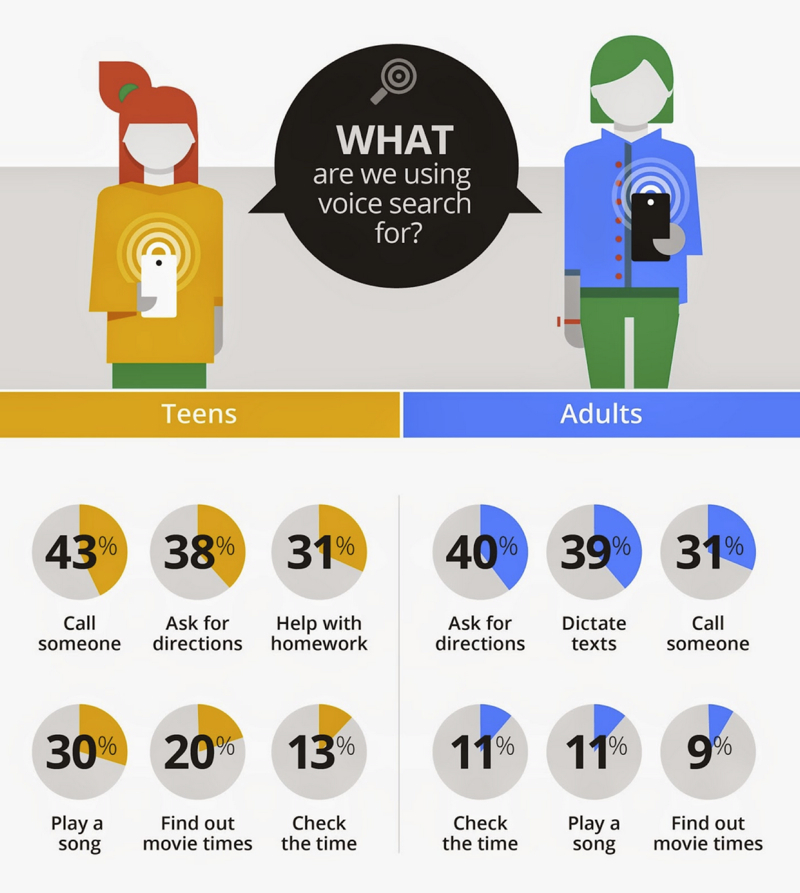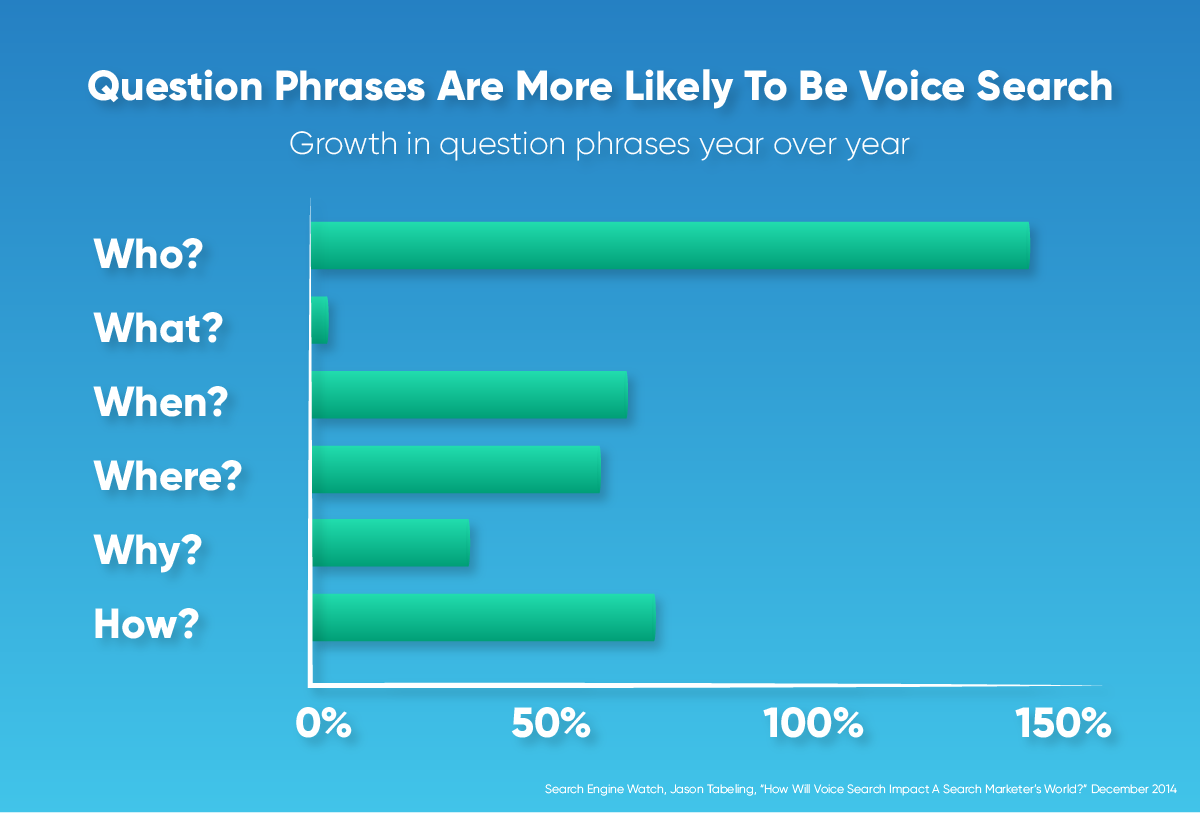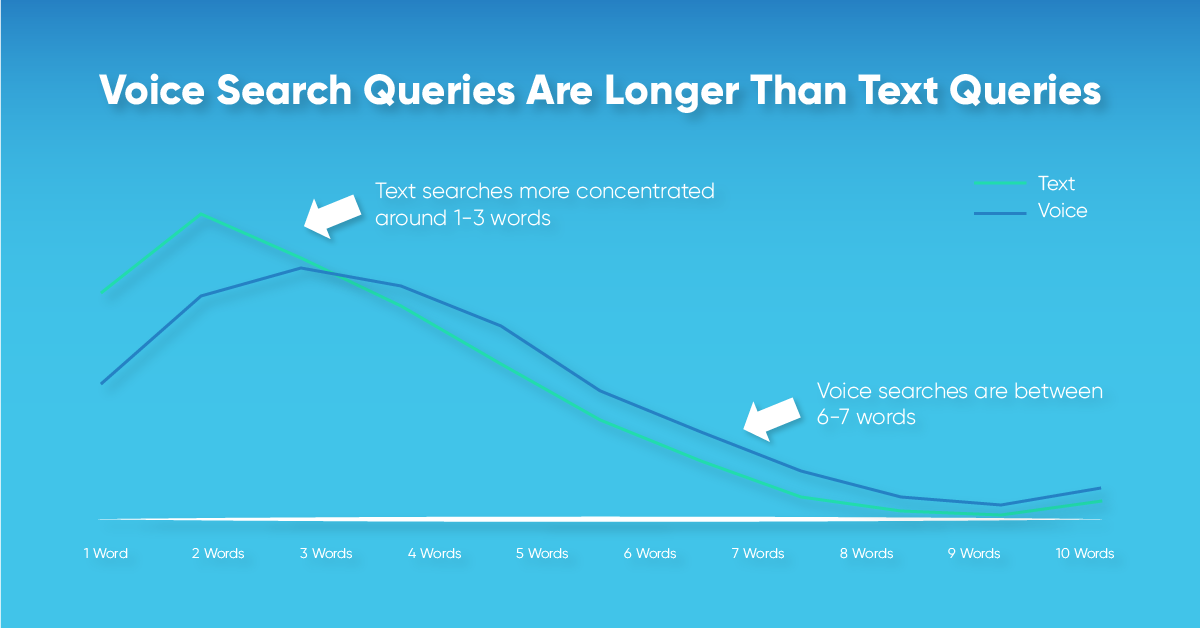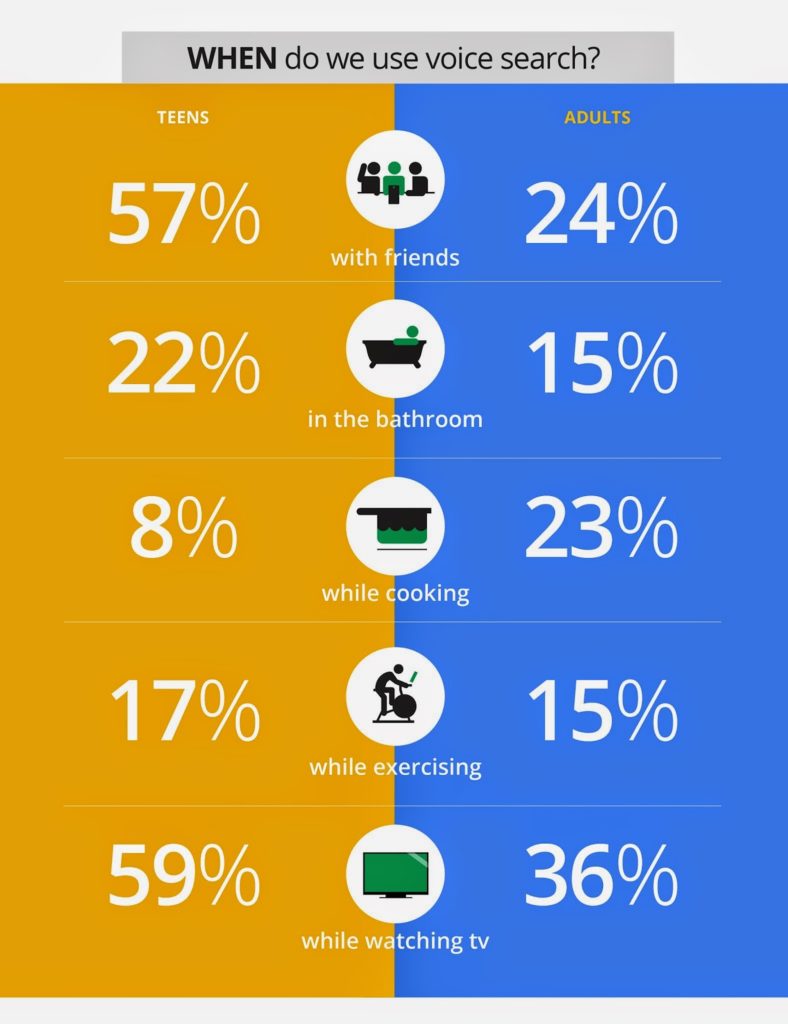The Impact of Voice Search on SEO
The impact of voice search on SEO is becoming more real as voice search is steadily growing in the search market. Discover how voice search is changing SEO strategy and how it will impact your website, business or both, either today or in the very near future.
What is Voice Search?
You have probably heard the term ‘voice search’ being used more recently with all the new voice-activated technology devices entering the market. The term ‘voice search’ refers to any device that uses a voice command to search the internet to provide your desired result. This is demonstrated in Google’s microphone in the search bar on mobile devices, or from Amazon’s Echo by just saying ‘Alexa’ (or the wake word you use for your device), or more famously and popularly known by Siri, an intelligent personal assistant (IPA). All of these voice controlled devices allow you to use a voice command to achieve a voice-enabled search on the internet or on your device to achieve the same type or text result.
The Growth of Voice Search
The company that brought the term ‘voice search’ to the industry was Google with the introduction of Google Voice Search in May 2002. As this was the original voice feature that turned mobile devices or desktops into voice controlled devices that allowed users to search Google by just speaking. Users would use Google Voice Search by saying “OK Google” and then be speaking their search intent like, “OK Google, what is the weather for tomorrow?” Google would then retrieve the weather forecast for tomorrow, based on the device’s location or if you specifically asked for a city and state in correlation with your weather search.
In October 2011 with the iPhone 4S, the device that brought voice search to the mainstream originated from Apple with the introduction of Siri, an intelligent personal assistant.
Since the invention of Siri, the voice controlled device market has grown steadily with users slowly adopting and incorporating voice search into their everyday lives.
However, voice search wasn’t widely adopted until recently, specifically when Amazon introduced the Amazon Echo. The device is controlled by Amazon Alexa or ‘Alexa’ for commands that allow you to use your voice to complete searches for tasks, like music playback, adding to your calendar, providing real-time information for weather, traffic, and answering your questions from online results.
Today, the market of voice search devices is rapidly growing with Amazon Alexa (i.e. Echo & Dot), Google Home (i.e. Mini & Max) and AppleTalk, now called Homepod becoming the familiar products that are recognized when people mention the term voice search now. However, there are many more voice controlled devices that are being incorporated into everyday products that are either impacting or are going to be impacting our everyday lives. These voice controlled devices are becoming ‘features’ of an already existing product on the market and aren’t being categorized with voice search devices at all, but are one in the same. Example, products like the Roku and Amazon Fire that have the voice to search feature on their remotes, to the launch of Home – Google’s voice-activated speaker powered by the Google Assistant and lately the integration of Google Assistant into the newer smart TVs now. December 2016 saw Amazon’s Echo products become their most popular product over the holiday period, with all voice-enabled devices expected to rapidly grow, even more, projections indicate by double in 2018. The growth of voice search is forever going to change the landscape of SEO, because of having to incorporate strategy with keywords, key terms, and content that will rank for voice searches being conducted by users. Creating another ‘element’ in SEO that strategists will have to consider moving forward.
| Voice Activated Technology | Voice Activated Device | Capabilities (Not Limited Too) |
| Virtual Assistants | Amazon Echo Amazon Alexa Google Home AppleTalk |
Home Control (temp, lights, etc.) Music Control Quick Facts Weather/News List Making Shopping (limited) |
| TV/Media Remotes | Amazon Firestick Roku Devices |
Change Channels Search Media Find Shows of Interest Set Timers/Preferences |
| Mobile Assistants |
Siri |
Web Search Make Phone Calls Dictate Texts Find a Location |
| Browser Assistants |
OK Google |
Web Search |
| Source: Seer Interactive | ||
Voice Search Statistics
In the past couple of years, there weren’t many statistics related to voice search. However, with the release of all the new voice-controlled devices with voice-activated technology, the usage has greatly influenced search behavior with search results and rankings. According to intelligentvoice.com in 2013, almost 85% of people had NOT used Siri on their Apple iPhone with iOS 7. But, according to Meeker Internet Trends in 2016, voice search is beginning to replace text or typing queries, with 20% of mobile queries being made with voice search with machine learning software accuracy at about 95 percent.
This correlates with Search Engine Watch claiming that Google voice search queries in 2016 were up 35 times over 2008 from Google Trends statistics. This is astounding now that “40% of adults are now using voice search once per day.” according to Location World and this number is only expected to grow as VoiceLabs has predicted that this year in 2017, 25 million voice-first devices will be shipped to having 33 million in operation. This correlates with MindMeld’s statistics in relation to voice search that 11% of people using voice search started more than 3 years ago, while 60% started in the last year and 41% started in the last 6 months. These numbers are only expected to grow and are going to make a crucial impact in the search world, primarily for SEOs.
What Voice Search Means For SEO?
Just like with any SEO, you have three types of search queries: transactional, informational, and navigational. This is the same with voice search, with the difference being more of a conversational search than a normal text or type search, that SEO is accustomed to performing. Focusing on keywords for a website and its pages was the initial way to conduct SEO. However now because of the Google Hummingbird update and with voice search, it’s shifting from keywords to conversational key phrases, not just ‘conversational keywords’ and understanding user intent. It’s not just computer language anymore, as technology is getting smarter with the incorporation of artificial intelligence and understanding the meaning, context, and purpose behind the user’s voice search query instead of ‘exact’ keywords.
For example, when people search for weather using text search or typed search, the searcher typically types in the text word ‘weather’ and then finds their city and state on the weather website they chose from the search results page. Another type of search the user can conduct is ‘weather city/state’ to receive direct results for what they searched for specifically for the weather. This is the closest text-based search that correlates with voice search but is not similar. Because with voice search when people want the weather it’s in a more conversational tone. For example, they’ll ask, “What is the weather going to be like today?” or “What is the weather going to be like this weekend in city/state?” They do this instead of the small ‘micro-type text-based searches’ that allow the searcher to navigate to their answer from search engine results. Now, instead of having to navigate the search engine results. The voice technology device is deciding the result for them and providing it to them with a voice-enabled answer.
Voice search allows the user to specifically receive their answer from their search intent with just one voice command, and this is faster than typing and navigating through a search results page.
However, users are not realizing that they have altered their search behavior with voice vs text type searches and are still achieving similar results. I state similar because the voice search technology is choosing the result for them, unlike text-based searches for the user to decide what they believe is most relevant to their search. This makes the Google Hummingbird update that brought the semantic context into the Google Search Algorithm even more important. This update correlated more with the searcher’s query with incorporating natural language and the intended meaning for better, more relevant results to the user. Likewise, it allowed Google to better understand the searcher’s intent.
Who is Using Voice Search?
The most interesting factor one has to understand is that voice search, maybe the third most popular search method at around 60% of usage, versus the first and second search method of opening up a mobile browser (80%), or typing the question into a search engine app (70%), according to a 2017 study done by Search Engine Watch. However, Google conducted a Mobile Voice Study in 2014 (no recent demographic studies have been completed on voice search) and discovered at that time 55% of teens and 41% of adults use voice search more than once a day. However, the most interesting discovery was that voice search was primarily being used when one is alone or with friends. Otherwise, both demographics found it not acceptable to use voice search in public and attributed it to being similar to somebody speaking loudly while on the phone in public.
However, the study concluded that each demographic admitted that they were scared of using voice search at first. But realizing how easy it was for using it and are now wanting voice search to do even more for them. Therefore, indicating that there is going to be a large shift and transition of voice search being more readily adopted in the coming years, which we are now starting to experience in 2017. But, will it replace the standard text search?
What is Voice Search Being Used For?
According to a majority of the research statistics on voice search. Voice Search is rapidly growing and being adapted to being used by the market. But voice search is being used for ‘simple searches’ or ‘short-tail keywords’ as indicated by Google in the graphic provided below. A simple search is essentially an informational or navigational search to provide a quick and relatively easy answer, which indicates the limitations of voice search versus more advanced searches or ‘long-tail keyword’ searches that require sifting through lots of specific and detailed information, primarily related to transactional searches (i.e. products, services, etc.). As people want to know specific information related to the product or services they are purchasing This is why the initial focus with voice search was as a digital personal assistant. Yet, the market is quickly expanding in voice search because of the adoption of it and as mentioned above with the different types of voice-activated technology and devices readily available in the market, it’s expected to expand as comScore states 50% of searches will be voice by 2020. The question that remains is voice search technology going to be able to adapt for more advanced searches to replace text-based searches? That isn’t believed to be the case by 2020, but the adoption of using voice search in everyday life is expected to change the everyday search habits of users and therefore impacting SEO strategy for all businesses in the upcoming new few years here.

https://googleblog.blogspot.com/2014/10/omg-mobile-voice-survey-reveals-teens.html
Voice Search Content & Keywords
Voice search makes it even more important for websites to not just rank their website for voice search but rank first with providing the most relevant and detailed information possible from all the potential search queries from voice search. Because voice search or artificial intelligence is deciding which ‘result’ to provide to the user instead of the user choosing the result from a search engine result page. Remember, with voice search the language is more conversational versus it being more computer-based with text searches.
Types of Queries
The types of queries that occur with text searches are usually pretty short, like about 2-4 words (i.e. ‘weather city/state’). This is why many website focus on having 1-2 primary keywords for their site and specifically 1-2 keywords per page. The types of queries that occur with voice searches are longer as they are around 7 words or more words because the keywords are in the ‘conversational’ tone (i.e. ‘what is the current weather in city/state?’). To rank for voice search, it is important to incorporate those 1-2 keywords into a more voice-friendly keyword content and text that can expand the keyword coverage on your website; and to be relevant for all the devices being used to conduct a search that includes desktop, mobile, tablets, and voice-devices.
Words for Questions
As explained above with the types of queries occurring on voice search, voice searches use questions queries or words than with text searches. The question words are “Who”, “What”, “Where”, “When”, “Why”, and “How” and all these informational question-based queries are looking for specific answers. It is important that your content on your website utilizes these question words or technically speaking adverbs and answer them as clearly, coherently and conversationally as possible to optimize for voice search. Ideally, this could be implemented on an FAQ page if it doesn’t already exist. For example, these question words could all be like:
1.) Who owns Google?
2.) What does Google do?
3.) When did Google start?
4.) Where is Google located?
5.) Why did Google buy YouTube?
6.) How do I get to Google?
If an FAQ page is not applicable to your website for some reason, just remember to focus on trying to incorporate these questions words throughout the content on the website. To ensure that you can be ranked for both text-based searches and voice-searches.

Conversational Phrases
By understanding the types of queries and the words for questions, your content needs to be written in a conversational phrase or context to ensure that your website can rank for both text and voice search. Websites can’t just focus on keywords anymore for rankings because Google is enforcing the relevancy of a website. This is demonstrated by the Google Hummingbird update, which aims to make your content more humanistic and conversational, instead of sounding stoic and stale for a computer program to read it and rank for those keywords. This puts even more of a focus and emphasis on content marketing for SEO, as they are essentially becoming one in the same now with the advancements in voice search and artificial intelligence.
SEO Challenges for Voice Search
The challenges for voice search is that the majority of searches, based on the trends are ‘simple’ searches basically focusing on informational and navigational types of searches. Although transactional searches can be conducted on some of the devices, statistics are indicating that it’s not happening, yet at least. Which makes the ranking for informational and navigational searches highly competitive, unless you are already ranking high, essentially number one for these searches, which normally isn’t the case, as dominant websites like Wikipedia may prevent you from achieving this high of the rank. The advantage may only come from local search results for informational and navigational, depending upon the specific nature of the query (i.e. “where is the best pizza shop” vs. “what is the best pizza shop?”)
Google Instant Answer
Working in SEO, we all know how difficult it can be for achieving rank zero, while extremely exciting when this is achieved in Google from their snippets for an instant answer. However, the challenge is that you need to be ranking on the first page from the voice search query and needing to have the right content structure for Google to select your website or blog for the instant answer from the voice search query. This will be challenging as these voice-activated technology devices are going to make achieving this even more challenging, based on the search queries and keyword or keyphrases that you are trying to rank for with your website.
Local Search
Lastly, the focus should be put into local search as the majority of voice searches are going to be local searches. However, the challenge is that your website needs to be already optimized for all the Local SEO standards to start being ranked for local searches on voice search. Therefore, local voice search is probably going to become a double-edged sword for local businesses. Especially since the voice search device or personal assistant decides which results is most relevant to the user, unless the user is specified in their voice search query. For example, if a user using voice search says “find pizza place” the voice search device will choose the nearest and most relevant business. But if the user states “find pizza hut” the voice search will locate the nearest pizza hut for that user. However, there have been some advances for the broader simple searches of “find a pizza place” with some voice assistants actually providing the number of locations that are related to pizza and will list them off for the user. The only problem is that depending upon the number of results the user could be over inundated with voice results and may only pay attention to the first, two or three listings being read from the list. Therefore, still emphasizing the importance of being ranked high in the results of local SEO.
Conversational Ranking
As discussed earlier and throughout this post. It cannot be emphasized enough that the conversational content is included with your website, primarily using the question words, as it is so much easier to write the marketing taglines or copy for your website to entice the visitor of your website to complete the intended conversion (i.e. signup for newsletter, purchase product or service, etc.). However, with voice search since the search queries are conducted in a conversational tone, it will be imperative to have this type of content/copy on your website to ensure you are able to provide the ranking for voice search. Depending upon the type of voice search device being used it can be difficult to achieve a conversion with a voice-activated device (i.e. Amazon Alexa, Google Home, etc.) versus the virtual assistants that can do a web search for you and provide the results, like if you did a text-based search in the browser yourself. This is going to be the most challenging aspect of voice search with SEO is truly understanding user intent and providing the most relevant possible to be ranked and chosen by the voice search assistant.

Voice Search Conclusion
For all of those that are feeling TLDR; this is what you need to understand and take away from the impact of voice search on SEO.
- The term ‘voice search’ refers to any device that uses a voice command to search the internet to provide your desired result.
- The company that brought the term ‘voice search’ to the industry was Google with the introduction of Google Voice Search in May 2002. MindMeld’s statistics in relation to voice search that 11% of people using voice search started more than 3 years ago, while 60% started in the last year and 41% started in the last 6 months. These numbers are only expected to grow and are going to make a crucial impact in the search world, primarily for SEO strategists.
- Voice search allows the user to specifically receive their answer from their search intent with just one voice command, and this is faster than typing and navigating through a search results page. However, users are not realizing that they have altered their search behavior with voice vs text type searches and are still achieving the similar results.
- voice search or artificial intelligence is deciding which ‘result’ to provide to the user instead of the user choosing the result from a search engine result page. Remember, with voice search the language is more conversational versus it being more computer-based with text searches.
- The challenges for voice search is that the majority of searches, based on the trends are ‘simple’ searches basically focusing on informational and navigational types of searches. Although transactional searches can be conducted on some of the devices, statistics are indicating that it’s not happening, yet at least. Which makes the ranking for informational and navigational searches highly competitive. The advantage for many may only come from local search results for informational and navigational, depending upon the specific nature and intent of the search query.
The growth of voice search is forever going to change the landscape of SEO, because of having to incorporate strategy with keywords, key terms, and content that will rank for voice searches being conducted by users. Creating another ‘element’ in SEO that strategists will have to consider moving forward. Contact AdShark Marketing today to have a free consultation on SEO!
Ready To Grow?
Let's Talk!



